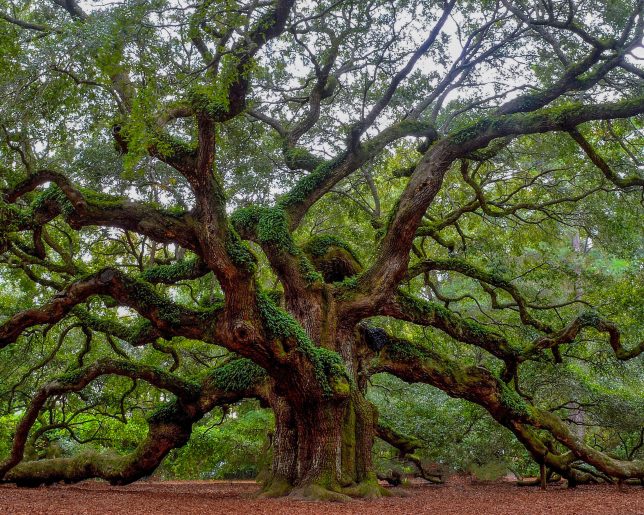
Happy Father’s Day to all the nature lovers out there!
This Father’s Day we’re taking a look at the diverse and profound symbols of “fatherhood” in nature. We found several nature-related symbols embodying fatherhood across a range of cultures and species. Take a quick journey with us to learn about these symbols.
Majestic father oak
Rooted in its attributes of strength, resilience, and longevity, the oak parallels qualities traditionally associated with fatherhood. Just as a father offers protection and guidance, the oak tree’s broad branches provide shelter. Its steadfast nature implies a dependable presence. In Celtic mythology, the oak was held in high reverence as a father figure, an emblem of stability and nurturing amid life’s tumultuous storms (Markale, J. (2004). The Celts: Uncovering the Mythic and Historic Origins of Western Culture). Its acorns, seen as seeds of potential, mirror a father’s role in fostering growth and development in his offspring. This majestic oak tree’s symbolism reflects the enduring, protective, and nurturing aspects of fatherhood, celebrating its essential role in the cycle of life.
Mountain, the patriarch
Mountains, due to their imposing stature, have been perceived as paternal figures across various cultures. Mount Olympus in Greek mythology was not only home to the gods but the dwelling place of Zeus, the father of gods and men (Source: Grimal, P. (1996). The Dictionary of Classical Mythology). Native American tribes like the Sioux perceive mountains as sacred and regard them as ‘grandfathers,’ signifying wisdom and spiritual guidance (Source: Brown, J. E. (1953). The Sacred Pipe: Black Elk’s Account of the Seven Rites of the Oglala Sioux).
Father sun
The sun, radiant and life-giving also represents fatherhood in numerous cultures. It exemplifies power, constancy, and nurturing. In Ancient Egyptian mythology, the sun god Ra was seen as the father of all gods, embodying warmth, life, and illumination (Source: Pinch, G. (2002). Handbook of Egyptian Mythology). Similarly, in many Native American cultures, the sun was often revered as a father figure, offering light, warmth, and growth to its children on Earth (Source: Hirschfelder, A. B., & Molin, P. F. (1992). The Encyclopedia of Native American Religions). The symbol of the father sun embodies the vital role of fathers as providers, protectors, and guiding lights in the lives of their offspring.
Lord lion
The lion serves as a powerful symbol of fatherhood. Renowned for its strength, courage, and protective instincts, the male lion’s role mirrors the archetypical father figure. It defends its pride against potential harm, embodying the protective aspect of fatherhood. The lion guides its young, teaching them essential survival skills, which encapsulates the mentoring facet of fatherhood (Source: DeMello, M. (2012). Animals and Society: An Introduction to Human-Animal Studies).
Eagle, the sire
The eagle, soaring high above the earth, represents a magnificent symbol of fatherhood in numerous cultures. Its exceptional strength, acute vision, and protective instincts correspond to the traditional roles and qualities associated with fatherhood. Among Native American cultures, the eagle, as a messenger of the Great Spirit, carries spiritual symbolism. It exemplifies wisdom, courage, and protective care – revered fatherly traits that guide and protect families (Source: Hirschfelder, A. B., & Molin, P. F. (1992). The Encyclopedia of Native American Religions). As the eagle prepares a safe nest and vigilantly guards its young, it embodies the nurturing and protective roles of a father. The soaring flight of the eagle conveys the encouragement fathers provide their children to reach great heights. The eagle’s symbolism captures the essence of fatherhood—nurturing, guiding, protecting, and inspiring the next generation.
Selfless seahorse as birthing papa
Unlike most species, it is the male seahorse that assumes the responsibility of pregnancy, challenging traditional paternal roles and symbolizing an exceptional level of paternal care and investment. This rare trait positions the seahorse as a representation of devoted fatherhood and redefines the boundaries of paternal roles within the natural world (Source: Wilson, R. A. (2010). The Labor of Words: Literary Professionalism in the Progressive Era). The male seahorse nurtures its young in its own body signifies a father’s deep commitment and selflessness, encapsulating an intimate bond with the offspring. The seahorse, in its unique biology, presents an unconventional yet compelling symbol of fatherhood, highlighting the profound nurturing, dedication, and flexibility inherent in this role.
The above examples show us that nature is rich with symbols that represent the multifaceted concept of “father.” These symbols extend from plants to celestial bodies to animals to sea life. They emphasize the qualities attributed to fatherhood—strength, protection, wisdom, and nurturing—and encapsulate the complex and universal essence of fatherhood.
